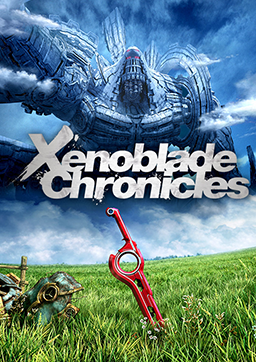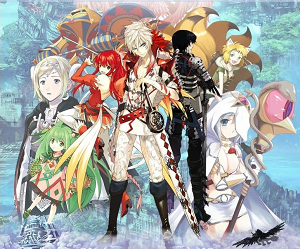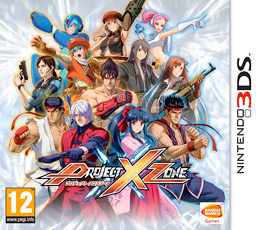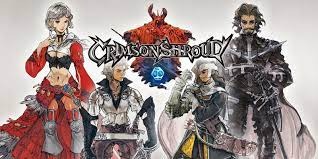The Slime series is a spinoff series of games from Dragon Quest featuring its Slime character. Three games have been released, the second of which, Dragon Quest Heroes: Rocket Slime, has been released in North America.
Megami Tensei, marketed internationally as Shin Megami Tensei, is a Japanese media franchise created by Aya Nishitani, Kouji "Cozy" Okada, Ginichiro Suzuki, and Kazunari Suzuki. Primarily developed and published by Atlus, and currently owned by Atlus, the franchise consists of multiple subseries and covers multiple role-playing genres including tactical role-playing, action role-playing, and massively multiplayer online role-playing. The first two titles in the series were published by Namco, but have been almost always published by Atlus in Japan and North America since the release of Shin Megami Tensei. For Europe, Atlus publishes the games through third-party companies.

Soma Bringer is a 2008 action role-playing game developed by Monolith Soft and published by Nintendo for the Nintendo DS. The player, controlling one of the eight main characters, explores dungeons and fights enemies in real-time combat across three-dimensional plains from a top-down perspective. Multiplayer functions allow up to three players to participate in exploration and combat. The story takes place on the continent of Barnea, where its principle magical energy, Soma, is disrupted by the arrival of monsters called Visitors. This prompts a military group called Pharzuph Division 7 to defeat the Visitors and restore the balance of Soma.

Dragon Quest X: Rise of the Five Tribes Online, also known as Dragon Quest X Online, is a massively multiplayer online role-playing game (MMORPG) developed and published by Square Enix. It is the tenth mainline entry in the Dragon Quest series. It was originally released for the Wii in 2012, and was later ported to the Wii U, Windows, PlayStation 4, Nintendo Switch, Android, iOS, and Nintendo 3DS, all of which support cross-platform play. Other than a discontinued Windows version in China, the game was not released outside of Japan. A single-player remake, titled Dragon Quest X Offline, was released in 2022 in Japan, followed by South-East Asia region on May 28, 2024 with additional South Korea, Traditional Chinese and Simplified Chinese languages support.

Xenoblade Chronicles is an action role-playing game developed by Monolith Soft and published by Nintendo for the Wii. Initially released in Japan in 2010, it was later released in the PAL regions in 2011 and in North America in 2012. A port for the New Nintendo 3DS was released in 2015, and a remaster for the Nintendo Switch, titled Xenoblade Chronicles: Definitive Edition, was released in May 2020. Xenoblade Chronicles is the first entry in the Xenoblade Chronicles series, a subseries which forms part of the larger Xeno metaseries. Although it lacks direct narrative connections to previous Xeno games, like them, it incorporates aesthetic and narrative elements from both fantasy and science fiction. The game features navigation through an open world split into zones, side-quests tied to party members' affinity, and a real-time action-based battle system which incorporates Shulk's ability to see brief glimpses of the future.

Fantasy Life is a role-playing life simulation game developed by Level-5 for the Nintendo 3DS. The game was self-released in Japan in 2012 and was published worldwide by Nintendo in 2014. The game was written and produced by Akihiro Hino with music by Nobuo Uematsu.

Monster Hunter 4 is an action role-playing game developed and published by Capcom. It is the fourth game in the Monster Hunter series and the second to be released on the Nintendo 3DS. Originally released in Japan on September 14, 2013. On January 26, 2014, an enhanced edition titled Monster Hunter 4G was announced for release in Japan on October 11, 2014, and allowed players to utilize Monster Hunter 4 save files. This version was released in North America and Europe as Monster Hunter 4 Ultimate on February 13, 2015. The new version of the game was released alongside New Nintendo 3DS in all regions except Australia, and in addition to the separate game release, it is available bundled with a 3DS XL variant of the newer console model.

Bravely Default, known in Japan as Bravely Default: Flying Fairy, is a role-playing video game developed by Silicon Studio for the Nintendo 3DS handheld console. Bravely Default was originally released in 2012 and later rereleased as an expanded edition in 2013 subtitled For the Sequel in Japan. For the Sequel was later released in Europe, Australia, and North America in 2014 simply titled as Bravely Default. This expanded edition used the subtitle Where The Fairy Flies in territories outside of Japan. Square Enix published the game in Japan, while Nintendo handled publishing duties overseas. The gameplay uses a turn-based battle system and job system, in addition to incorporating options to combine job abilities and adjust battle speed and random encounter rates.
The Guild series is a compilation of video games produced by Level-5 for the Nintendo 3DS in cooperation with various game designers. The first compilation, Guild01, consists of four games and was released at retail in Japan on May 31, 2012. Three of the titles have been announced for individual release on the Nintendo eShop in Western territories during Fall 2012. All four of them were released individually on the Japanese eShop not long after. A second compilation, Guild02, which features three games designed by Keiji Inafune, Kazuya Asano, Takemaru Abiko and Kaz Ayabe, was released on the Nintendo eShop in Japan during March 2013 and began releasing in Western territories in May 2013.

Unchained Blades, titled UnchainBlades ReXX in Japan, is a 2011 dungeon crawler role-playing video game developed by FuRyu and published by Xseed Games for the Nintendo 3DS and PlayStation Portable.

Project X Zone is a crossover tactical role-playing video game for the Nintendo 3DS developed by Monolith Soft with assistance from Capcom and Red Entertainment and published by Namco Bandai Games. It is a follow-up to Namco × Capcom and features characters from Namco Bandai, Capcom, and Sega. The game was released on October 11, 2012 in Japan; June 25, 2013 in North America; and July 5, 2013 in Europe. Project X Zone received mixed to positive reviews upon release; praise went towards the game's cast, combat system, and presentation, but criticism was directed at its repetitive gameplay and confusing storyline.

Code of Princess is an action role-playing video game developed by Studio Saizensen and originally published by Agatsuma Entertainment for Nintendo 3DS. It was released in Japan in April 2012 by Agatsuma Entertainment, and in North America by Atlus USA in October 2012, Agatsuma Entertainment also published the game in Europe and Australia in March 2013, exclusively as an eShop title. A version for Windows was released in April 2016. An enhanced port entitled Code of Princess EX launched for the Nintendo Switch between July and August 2018, courtesy of Nicalis worldwide, and Pikii in Japan.

Angry Birds Trilogy is a video game co-developed by Rovio Entertainment, Exient Entertainment, Housemarque, and Fun Labs and published by Activision.

Crimson Shroud is a role-playing video game developed and published by Level-5, with assistance from Nex Entertainment. It was released for the Nintendo 3DS in 2012 as apart of Level-5's Guild compilation series, with it being released separately on the Nintendo eShop.

Kokuga (コクガ) is a shoot 'em up game released by G.rev in 2012 for the Nintendo 3DS. It was directed by Hiroshi Iuchi, famous for his seminal shmups Radiant Silvergun and Ikaruga. Unlike many worldwide releases, the game wasn't released in Canada and the developer was only notified that they would not be able to, late in the preparation process.

Bravely Second: End Layer is a role-playing video game developed by Silicon Studio for the Nintendo 3DS handheld console and is the direct sequel to Bravely Default. It was published by Square Enix in Japan on April 23, 2015, and by Nintendo in North America, Europe, and Australia in 2016.

Monster Hunter Generations is an action role-playing game developed and published by Capcom for the Nintendo 3DS. Announced in May 2015, the game was released in Japan as Monster Hunter X in November 2015 and internationally in July 2016. Like other titles in the Monster Hunter series, players undertake quests that involve hunting large dangerous creatures, either solo or in multiplayer. Major additions in this installment include special attacks, new combat styles, and the ability to play as Felynes who have traditionally only appeared as a companion to the player. Monster Hunter Generations is considered the fourth major portable title in the series, following Monster Hunter Portable 3rd. An expanded version of the game, titled Monster Hunter XX, was announced in October 2016, and was released exclusively in Japan in March 2017. An HD port of the expanded re-release for the Nintendo Switch, titled Monster Hunter Generations Ultimate, was released in Japan in August 2017 followed by a worldwide release in August 2018. The game has sold more than 8 million units worldwide, as of September 2020.

Teddy Together is a life simulator video game developed by Arika for the Nintendo 3DS handheld video game console. The game is a localized version of a 2013 Japanese game called Kuma-Tomo. The game was released in Europe on July 1, 2016, and Australia and New Zealand on July 2. While the Japanese release was published by Bandai Namco Games, under the Namco label, the English language release was published by Nintendo. The game is based around the player taking care of a teddy bear. The game was praised for being a good game for younger audiences, although some Western critics found the bear's overly cheery appearance to be off-putting.

The Legend of Heroes: Trails of Cold Steel II is a 2014 role-playing video game developed by Nihon Falcom. The game is a part of the Trails series, itself a part of the larger The Legend of Heroes series, and serves as a sequel to The Legend of Heroes: Trails of Cold Steel.

Trinity Trigger is an action role-playing game published by FuRyu and developed by Three Rings for the Nintendo Switch, PlayStation 4, PlayStation 5, and Windows. The game was released in Japan on September 15, 2022, and in English by Xseed Games in mid-2023.


















